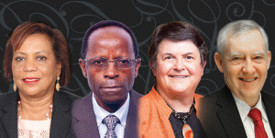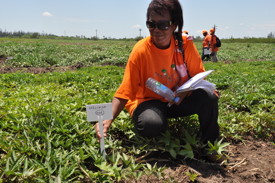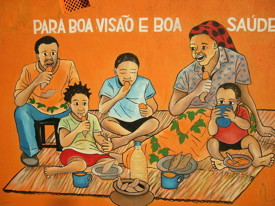Leading the Fight against Malnutrition and Hidden Hunger
A Conversation with the 2016 World Food Prize Laureates
Monday, 10 Oct 2016 at 8:00 pm – Great Hall, Memorial Union
Join a conversation with the 2016 World Food Prize Laureates about their work building bridges between agriculture and nutrition to improve the health and livelihoods of millions of under-nourished people around the globe. Maria Andrade, Robert Mwanga and Jan Low of the International Potato Center, along with HarvestPlus founder Howarth Bouis, have been honored as pioneers in biofortification with the development and adoption of staple crops conventionally bred to include critical vitamins and micronutrients. Their multi-sector approach has integrated plant science research, extension-style agronomy, nutrition education, and effective marketing and dissemination strategies to successfully deliver breakthroughs like the Vitamin A-enriched orange-fleshed sweet potato and iron- and zinc-fortified beans, rice, and wheat to both farmers' fields and consumers' tables. Iowa State Professor Clark Wolf, director of the Bioethics Program, will moderate the discussion. The 2016 Norman Borlaug Lecture and part of the World Affairs SeriesA reception and student poster display will precede the lecture from 7 to 8 p.m. in the South Ballroom, Memorial Union. Posters will address world food issues and are submitted by undergraduate and graduate students.
This year marks the 30th anniversary of the establishment of the World Food Prize by the late Nobel Peace Prize Laureate Dr. Norman E. Borlaug, the Iowa agronomist whose discoveries sparked the Green Revolution.
Three of the 2016 laureates - Dr. Maria Andrade, Dr. Robert Mwanga and Dr. Jan Low of the International Potato Center - are being honored for their work developing the single most successful example of biofortification: the orange–fleshed sweet potato (OFSP). The potato was developed to counter the devastating effects of Vitamin A deficiency, which contribute to high rates of blindness, diarrhea, immune system disorders, and premature death in children and pregnant women in Africa. Andrade and Mwanga, plant scientists in Mozambique and Uganda, bred the Vitamin A-enriched OFSP, while Low structured the nutrition studies and programs that convinced almost two million households in 10 separate African countries to plant, purchase and consume this nutritionally fortified food. Together, they built a bridge from agriculture to nutrition and health that has changed the way the international development community works.
Dr. Howarth Bouis has worked for more than 25 years at the Washington DC-based International Food Policy Research Institute. His early research showed that by increasing nutrients in staple crops accessible to low-income families, malnutrition and under-nutrition could be significantly reduced and general health, productivity, and livelihoods could be greatly improved. Bouis became convinced that research on nutrition in developing countries should focus on dietary quality, not calories, and that through conventional breeding techniques it would be possible to increase the micronutrient content of staple foods, which are the primary foods accessible to the rural poor.
In 2003 Bouis created the organization HarvestPlus, within the International Food Policy Research Institute, as a global multi-sector, multidisciplinary effort to improve nutrition and public health through crop biofortification. Under his leadership a large coalition of plant breeders, agronomists, nutritionists, and economists have worked together to form one of the most successful initiatives to improve nutrition through changes in the food system. Countries where crops have been released include Bangladesh (zinc rice), the Democratic Republic of Congo (iron beans and Vitamin A cassava), India (iron pearl millet, zinc rice and zinc wheat), Nigeria (Vitamin A cassava and maize), Rwanda (iron beans), Uganda (Vitamin A OFSP and iron beans), Mozambique (Vitamin A OFSP), Zambia (Vitamin A maize), and Pakistan (zinc wheat).
Additional biographical information:
Maria Andrade
Robert Mwanga
Jan Low
Howarth Bouis
Cosponsored By:
- Global Food Security Consortium
- Nutritional Sciences Council
- Office of the President
- World Affairs
- World Food Prize Foundation
- Committee on Lectures (funded by Student Government)
Stay for the entire event, including the brief question-and-answer session that follows the formal presentation. Most events run 75 minutes.
Sign-ins are after the event concludes. For lectures in the Memorial Union, go to the information desk in the Main Lounge. In other academic buildings, look for signage outside the auditorium.
Lecture Etiquette
- Stay for the entire lecture and the brief audience Q&A. If a student needs to leave early, he or she should sit near the back and exit discreetly.
- Do not bring food or uncovered drinks into the lecture.
- Check with Lectures staff before taking photographs or recording any portion of the event. There are often restrictions. Cell phones, tablets and laptops may be used to take notes or for class assignments.
- Keep questions or comments brief and concise to allow as many as possible.






